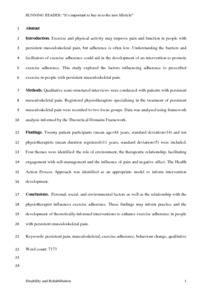Meade, LB; Bearne, LM; Godfrey, EL
(2021)
"It's important to buy in to the new lifestyle": barriers and facilitators of exercise adherence in a population with persistent musculoskeletal pain.
Disabil Rehabil, 43 (4).
pp. 468-478.
ISSN 1464-5165
https://doi.org/10.1080/09638288.2019.1629700
SGUL Authors: Bearne, Lindsay Mary
![[img]](https://openaccess.sgul.ac.uk/114802/6.hassmallThumbnailVersion/It_s_important_to_buy.pdf)  Preview |
|
PDF
Accepted Version
Available under License ["licenses_description_publisher" not defined].
Download (608kB)
| Preview
|
Abstract
INTRODUCTION: Exercise and physical activity may improve pain and function in people with persistent musculoskeletal pain, but adherence is often low. Understanding the barriers and facilitators of exercise adherence could aid in the development of an intervention to promote exercise adherence. This study explored the factors influencing adherence to prescribed exercise in people with persistent musculoskeletal pain. METHODS: Qualitative semi-structured interviews were conducted with patients with persistent musculoskeletal pain. Registered physiotherapists specializing in the treatment of persistent musculoskeletal pain were recruited to two focus groups. Data was analyzed using framework analysis informed by the Theoretical Domains Framework. FINDINGS: Twenty patient participants (mean age = 44 years, standard deviation = 14) and ten physiotherapists (mean duration registered = 11 years, standard deviation = 5) were included. Four themes were identified: the role of environment, the therapeutic relationship, facilitating engagement with self-management and the influence of pain and negative affect. The Health Action Process Approach was identified as an appropriate model to inform intervention development. CONCLUSIONS: Personal, social, and environmental factors as well as the relationship with the physiotherapist influences exercise adherence. These findings may inform practice and the development of theoretically-informed interventions to enhance exercise adherence in people with persistent musculoskeletal pain.Implications for rehabilitationExercise and physical activity can decrease pain while improving mobility in a population with persistent musculoskeletal pain, but adherence to prescribed programs is low.The physical and social environment, the influence of pain, and negative affect may act as barriers to exercise adherence, while fostering a collaborative therapeutic relationship and facilitating self-management may enhance exercise adherence.The findings from the current study align with the constructs theorized by the Health Action Process Approach to support initiation and maintenance of behavior. This may provide a suitable theoretical framework to support the development of a targeted intervention.Healthcare providers, specifically physiotherapists, may find that facilitating self-management strategies that emphasize coping skills to overcome personal, social and environmental barriers may enhance exercise adherence in their patients.
| Item Type: |
Article
|
| Additional Information: |
This is an Accepted Manuscript of an article published by Taylor & Francis in Disability and Rehabilitation on 26/6/19, available at: http://www.tandfonline.com/10.1080/09638288.2019.1629700. |
| Keywords: |
Persistent pain, behavior change, exercise adherence, musculoskeletal, qualitative, Adult, Exercise, Exercise Therapy, Humans, Life Style, Musculoskeletal Pain, Physical Therapists, Qualitative Research, Humans, Exercise, Exercise Therapy, Life Style, Qualitative Research, Adult, Musculoskeletal Pain, Physical Therapists, Persistent pain, musculoskeletal, exercise adherence, behavior change, qualitative, 11 Medical and Health Sciences, Rehabilitation |
| SGUL Research Institute / Research Centre: |
Academic Structure > Population Health Research Institute (INPH) |
| Journal or Publication Title: |
Disabil Rehabil |
| ISSN: |
1464-5165 |
| Language: |
eng |
| Dates: |
| Date | Event |
|---|
| February 2021 | Published | | 26 June 2019 | Published Online | | 5 June 2019 | Accepted |
|
| Publisher License: |
Publisher's own licence |
| PubMed ID: |
31242395 |
| Web of Science ID: |
WOS:000475276500001 |
 |
Go to PubMed abstract |
| URI: |
https://openaccess.sgul.ac.uk/id/eprint/114802 |
| Publisher's version: |
https://doi.org/10.1080/09638288.2019.1629700 |
Statistics
Item downloaded times since 21 Sep 2022.
Actions (login required)
 |
Edit Item |



